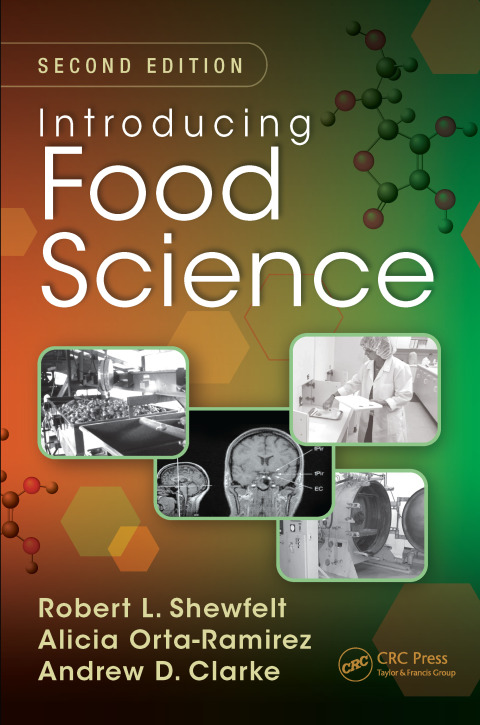Description
Efnisyfirlit
- Preface
- Acknowledgments
- Authors
- Contributors
- Section I – Food Issues in the News
- Chapter 1 – Food Safety
- 1.1 Food in the News
- 1.2 Unsafe Foods
- 1.3 Microbial Hazards
- 1.4 Spoiled: When Good Food Goes Bad
- 1.5 Food Poisoning
- 1.6 Tracking Down the Culprits
- 1.7 Expiration Dates
- 1.8 Food Preservation
- 1.9 Preservatives
- 1.10 Safety of the American Food Supply
- 1.11 Safety in the Home
- 1.12 Pesticides and Other Contaminants
- 1.13 Natural Toxins
- 1.14 Allergies and Food Sensitivities
- 1.15 Governmental Regulation
- 1.16 Remember This!
- 1.17 Looking Ahead
- Testing Comprehension
- References
- Further Reading
- Chapter 2 – Healthiness of Foods
- 2.1 Looking Back
- 2.2 Healthy Foods and Unhealthy Foods
- 2.3 Energy from Foods
- 2.4 Food and Disease
- 2.5 Weight Loss without Pain
- 2.6 Popular Diets, Food Fads, and Their Consequences
- 2.7 Fake Fats
- 2.8 Dietary Supplements, Nutraceuticals, and Functional Foods
- 2.9 Enhancing Athletic Performance
- 2.10 Six Glasses a Day
- 2.11 Fasting
- 2.12 Eating Disorders
- 2.13 Natural, Organic, and Whole Foods
- 2.14 Reading the Label
- 2.15 Designing a Healthy Diet
- 2.16 Remember This!
- 2.17 Looking Ahead
- Testing Comprehension
- References
- Further Reading
- Chapter 3 – Foods We Eat
- 3.1 Looking Back
- 3.2 Food Choices
- 3.3 Sensory Characteristics
- 3.4 Price
- 3.5 Health
- 3.6 Safety
- 3.7 Weight Loss
- 3.8 Weight Gain
- 3.9 Social Factors
- 3.10 Religious Influences
- 3.11 Ethnicity
- 3.12 Family Traditions
- 3.13 Advertising
- 3.14 Time and Trends
- 3.15 Personal Philosophy
- 3.16 Convenience
- 3.17 Pathogenic Eating
- 3.18 Psychological Factors
- 3.19 Meal Patterns around the World
- 3.20 Selecting Healthy Foods
- 3.21 Remember This!
- 3.22 Looking Ahead
- Testing Comprehension
- References
- Further Reading
- Section II – Commercial Food Products
- Chapter 4 – Processed Foods
- 4.1 Looking Back
- 4.2 What Are Processed Foods and Why Are They Processed?
- 4.3 Benefits of Processing
- 4.4 Processing Steps
- 4.5 Types of Food Processes
- 4.5.1 Heating
- 4.5.2 Freezing
- 4.5.3 Drying
- 4.5.4 Concentrating
- 4.5.5 Curing
- 4.5.6 Milling
- 4.5.7 Extracting
- 4.5.8 Fermenting
- 4.5.9 Irradiating
- 4.5.10 Nonthermal Processing
- 4.6 Consequences of Processing
- 4.6.1 Shelf Life
- 4.6.2 Nutrition
- 4.6.3 Quality
- 4.6.4 Safety
- 4.6.5 Packaging Considerations
- 4.7 Remember This!
- 4.8 Looking Ahead
- Testing Comprehension
- Reference
- Further Reading
- Chapter 5 – Formulated Foods
- 5.1 Looking Back
- 5.2.1 Benefits and Consequences
- 5.2.2 Formulation Steps
- 5.2.3 Clean Labels
- 5.3 Types of Ingredients and Their Function
- 5.3.1 Flours and Grains
- 5.3.2 Fruits and Vegetables
- 5.3.3 Dairy and Eggs
- 5.3.4 Plant Proteins
- 5.3.5 Fats and Oils
- 5.3.6 Sweeteners
- 5.3.7 Fat Replacers
- 5.3.8 Flavorants and Colorants
- 5.3.9 Stabilizers
- 5.3.10 Preservatives
- 5.4 Formulated Products
- 5.4.1 Baked Goods
- 5.4.2 Pasta and Noodles
- 5.4.3 Gluten-Free Products
- 5.4.4 Beverages
- 5.4.5 Confections
- 5.4.6 Sausages
- 5.4.7 Frozen Desserts and Entrées
- 5.4.8 Functional Foods
- 5.5 Remember This!
- 5.6 Looking Ahead
- Testing Comprehension
- References
- Further Reading
- Chapter 6 – Chilled and Prepared Foods
- 6.1 Looking Back
- 6.3 Chilled Foods
- 6.3.1 Whole Fresh Fruits and Vegetables
- 6.3.2 Packaged Salad Vegetables and Cut Fruits
- 6.3.3 Fresh Fish and Seafood
- 6.3.4 Fresh Meats
- 6.3.5 Deli Meats
- 6.3.6 Milk and Its Alternatives
- 6.3.7 Spreads
- 6.3.8 Prepared Foods
- 6.3.9 Salads and Sandwiches
- 6.3.10 Pasta Products
- 6.3.11 Prepared Entrées
- 6.4 Food Service
- 6.4.1 Fine-Dining Restaurants
- 6.4.2 Casual-Dining Restaurants
- 6.4.3 Campus Dining
- 6.4.4 Fast Foods
- 6.4.5 Catering
- 6.4.6 Vending Machines
- 6.5 Remember This!
- 6.6 Looking Ahead
- Testing Comprehension
- References
- Further Reading
- Section III – Functions of Food Scientists
- Chapter 7 – Quality Assurance
- 7.1 Looking Back
- 7.2 What Is Quality and Why Does Anybody Care?
- 7.3 Quality Characteristics
- 7.4 Measuring Quality
- 7.5 Evolution of Quality Management
- 7.5.1 Monitoring Quality in a Processing Plant
- 7.5.2 Quality Department
- 7.6 Statistical Process Control
- 7.7 Hazard Analysis and Critical Control Point
- 7.8 Sanitation
- 7.9 Consumer Acceptability
- 7.10 Remember This!
- 7.11 Looking Ahead
- Testing Comprehension
- References
- Further Reading
- Chapter 8 – Product and Process Development
- 8.1 Looking Back
- 8.2 Proliferation of Food Products
- 8.3 Generating New Food Product Ideas
- 8.4 Improving Existing Products
- 8.5 Brand New Products
- 8.6 Reality Check
- 8.7 Food Formulation
- 8.8 Process Operations
- 8.9 Quality Evaluation
- 8.10 Storage Stability
- 8.11 Package Development
- 8.12 Package Labels
- 8.13 Scale-Up and Consumer Testing
- 8.14 Market Testing
- 8.15 Product Launch
- 8.16 Success or Failure
- 8.17 Remember This!
- 8.18 Looking Ahead
- Testing Comprehension
- Further Reading
- Chapter 9 – Sustainability and Distribution
- 9.1 Looking Back
- 9.2 Sustainability
- 9.3 Distribution
- 9.4 Supply Chains
- 9.5 Sustainability Systems from Farm to Consumer
- 9.5.1 Life-Cycle Analysis
- 9.5.2 Fieldprints
- 9.5.3 The Value Chain
- 9.5.4 Processing Efficiency
- 9.5.5 Sustainability of Packaging Materials
- 9.5.6 Distributor Sustainability
- 9.5.7 Quality at Retail
- 9.5.8 Consumer Responsibility
- 9.6 A Sustainability Index
- 9.7 Remember This!
- 9.8 Looking Ahead
- Testing Comprehension
- References
- Further Reading
- Chapter 10 – Government Regulation and Scientific Research
- 10.1 Looking Back
- 10.2 Governmental Regulation
- 10.2.1 Food Safety
- 10.2.2 Preventive Control Programs
- 10.2.3 Recalls
- 10.2.4 Quality
- 10.2.5 Labeling
- 10.2.6 Imports/Exports
- 10.2.7 Other Agency Involvement
- 10.3 Scientific Research and Technology Development
- 10.3.1 Processing and Engineering
- 10.3.2 Microtechnology and Nanotechnology
- 10.3.3 Chemistry
- 10.3.4 Nutritional Properties
- 10.3.5 Microbiology and Toxicology
- 10.3.6 Sensory Quality and Other Frontiers
- 10.4 Remember This!
- 10.5 Looking Ahead
- Testing Comprehension
- Reference
- Further Reading
- Section IV – Scientific Principles
- Chapter 11 – Food Chemistry
- 11.1 Looking Back
- 11.2 Chemistry of Our Foods
- 11.2.1 Water
- 11.2.2 Carbohydrates
- 11.2.3 Lipids
- 11.2.4 Proteins
- 11.2.5 Enzymes
- 11.2.6 Vitamins and Minerals
- 11.2.7 Preservatives and Other Food Additives
- 11.2.8 Colors and Flavors
- 11.3 Sources of Food Chemicals
- 11.3.1 Plants
- 11.3.2 Animals
- 11.4 Toxic Compounds in Foods
- 11.5 An Integrated Approach to Food Chemistry
- 11.6 Remember This!
- 11.7 Looking Ahead
- Testing Comprehension
- Further Reading
- Chapter 12 – Nutrition
- 12.1 Looking Back
- 12.2 Nutrients in Foods
- 12.2.1 Proteins
- 12.2.2 Lipids
- 12.2.3 Carbohydrates
- 12.2.4 Vitamins and Minerals
- 12.2.5 Water and Electrolytes
- 12.3 Alcohol
- 12.4 Nutrient Composition of Foods
- 12.4.1 Grains
- 12.4.2 Vegetables
- 12.4.3 Fruits
- 12.4.4 Dairy
- 12.4.5 Protein Foods
- 12.4.6 Oils
- 12.4.7 Processed, Formulated, Chilled, and Prepared Foods
- 12.5 Digestion and Intermediary Metabolism
- 12.6 Nutritional Deficiency Diseases
- 12.7 Antioxidants, Supplements, and Antinutrients
- 12.8 Obesity
- 12.9 Remember This!
- 12.10 Looking Ahead
- Testing Comprehension
- References
- Further Reading
- Chapter 13 – Food Microbiology
- 13.1 Looking Back
- 13.2 Food Microbiology
- 13.3 Types of Microorganisms in Our Foods
- 13.4 Microbial Genetics
- 13.5 Cell Physiology and Reproduction
- 13.6 Sources of Microbial Contamination
- 13.7 Environmental Conditions Affecting Microbial Growth
- 13.8 Food Compositional Factors Affecting Microbial Growth
- 13.9 Fermentation Microorganisms
- 13.10 Spoilage Microorganisms
- 13.11 Pathogenic Microorganisms
- 13.12 Epidemiology
- 13.13 Controlling Microorganisms in Foods
- 13.14 Remember This!
- 13.15 Looking Ahead
- Testing Comprehension
- Further Reading
- Chapter 14 – Food Engineering
- 14.1 Looking Back
- 14.2 What Is a Food Engineer?
- 14.3 Engineering Fundamentals
- 14.4 Mass Balance
- 14.5 Energy Balance
- 14.6 Heat Transfer
- 14.6.1 Thermal Properties of Materials
- 14.6.2 Heat Transfer Coefficients
- 14.7 Mass Transfer
- 14.7.1 Fick’s Law of Diffusion
- 14.7.2 Convective Mass Transfer
- 14.8 Rheology
- 14.8.1 Rheological Properties and Types of Fluids
- 14.9 Flow of Fluids
- 14.10 Water Management
- 14.11 Remember This!
- 14.12 Looking Ahead
- Testing Comprehension
- Reference
- Further Reading
- Chapter 15 – Sensory and Consumer Science
- 15.1 Looking Back
- 15.2 Sensory Quality of Foods
- 15.2.1 Sensory Perception and Physiological Response
- 15.2.2 Appearance
- 15.2.3 Flavor
- 15.2.4 Texture
- 15.3 Sensory Tests
- 15.3.1 Difference Tests
- 15.3.2 Thresholds
- 15.3.3 Sensory Descriptive Analysis
- 15.3.4 Time Intensity
- 15.3.5 Functional Magnetic Resonance Imaging
- 15.3.6 Integrating Sensory and Physicochemical Tests
- 15.3.7 Consumer Testing
- 15.3.8 Integrating Sensory and Consumer Tests
- 15.4 Remember This!
- Testing Comprehension
- References
- Further Reading
- Glossary






